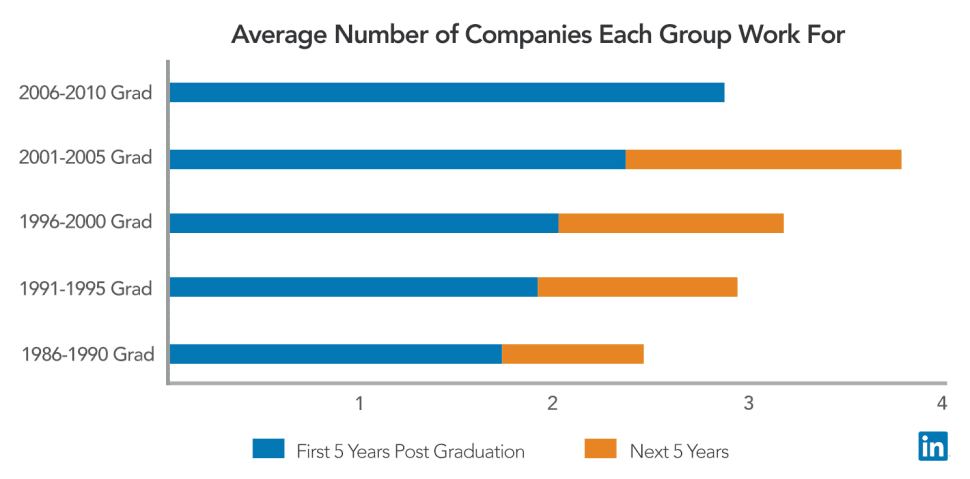When I was growing up, my concept of work was based on roles I was exposed to in my daily life: doctors, emergency workers or shop assistants. Even when I got older and better understood the breadth and depth of business and the roles within it, I still never imagined that I would be a ‘growth manager’ today. To be fair, that’s probably something that didn’t exist five years ago; technology has completely changed the way companies recruit and the way people build and manage their careers.
Now that people can work remotely and obtain information quickly; a nine-to-five job, with a fixed career trajectory, in a hierarchical company is becoming less and less attractive to today’s talent pool. Companies that are offering flexible work hours, providing employees with opportunities to “learn and progress,” and use team-focused organizational structures are attracting new talent and enhancing the employee experience.
How companies can adapt to the changing world of work:
Provide ongoing learning opportunities and projects
A static career is no longer appealing. Technology has made information extremely accessible and has given us the opportunity to learn quickly and transform ourselves. A recent report by LinkedIn reveals that 4 job changes by age 32 is now the norm. Millennials are more interested in trying out different jobs than previous generations.
Additionally, The 2017 Deloitte Human Capital Trends report discusses how the “new rule” of the organization of the future is structured based on work and projects as opposed to the business function with functional leaders. Individuals will be recognised by the projects they work on and the skills they developed on each project.
Companies can adapt by being more open with job roles and creativity. They can provide ongoing learning opportunities for employees not only in the workplace but also outside the workplace. Offering a subscription to lynda, or a reimbursement for taking classes can be a game-changer for an individual choosing between two jobs. Companies should also create ownership around varying projects and make sure to highlight the growth of each employee.
Be flexible
Individuals no longer talk exclusively about ‘what they do at work.’ Careers have become a defining part of a person’s life. I get to say “I have a great life and do some really fun, interesting stuff – sometimes at the office, sometimes while travelling, and sometimes in the pub.” A 2013 branding report found 45% of Millennials will choose workplace flexibility over pay. To adapt to these changing expectations, companies should put a work from home policy in place. If projects are getting done on time, who cares where your employees work?
Focus on the whole person and outline impact
Today, we know a lot about what is happening in the world; all this information is literally at our fingertips. As a result, individuals want to make a positive impact and feel like they are part of something significant. Making meaningful connections at work, playing a role in working toward a company’s mission, and developing oneself professionally are a must.
Companies must focus on the whole person, rather than just the PA’s attention to detail, or the project manager’s ability to multitask. By understanding people’s personal skills and experiences, you give them permission to ‘get stuff done’, not just operate in line with their job title.
It is also important for companies to create a strong sense of community amongst employees. People want to feel like they know their co-workers. Luckily, there are tools that encourage greater interaction amongst employees. Slack is a cloud-based set of team collaboration tools and services where different sites within a company can communicate with one another, and team members who are out on the road can keep up with company developments. HR management software hibob has a clubs tool focusing on the natural groups and cultures that exist within every business. If you nurture your employee interests, people will be encouraged to bloom; they’ll feel engaged and part of the tribe.
Pulling it all together- an opportunity for HR
Companies now understand that they need to make changes to the way they recruit and manage their employees. HR has the opportunity to play a significant role in shifting organisations to a more strategic and employee-centric talent management approach for the digital age. It’s pretty cool that titles such as “Sustainability Manager,” “Drone Operator,” and “App Developer” exist today… and it’s only going to get more interesting from here.

From Sharon Argov
Sharon, VP of Growth at HiBob, is a serial entrepreneur with expertise in B2B marketing. Prior to HiBob, she served as the Marketing Director at 888 holdings. In addition, Sharon ran her own boutique marketing agency and was the CEO and Founder of Fundbird, a unique online platform that assists small UK businesses with funding solutions (acquired). In her free time, Sharon likes to watch documentaries and explore the cultural scene of Tel Aviv.


